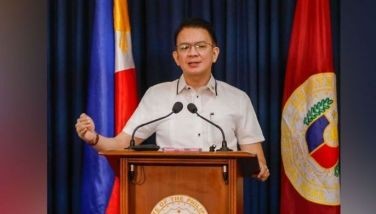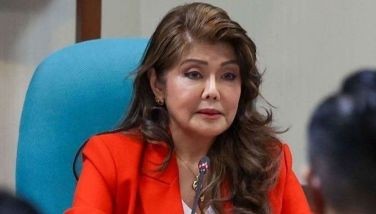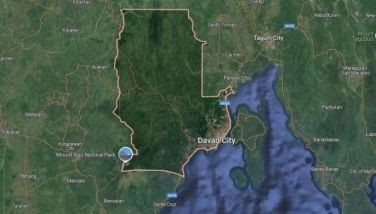Mining meet ends on high note; Gozun affirms framework for revitalization
December 5, 2003 | 12:00am
Environment and Natural Resources Secretary Elisea Gozun has affirmed the success of what has become the country’s largest forum for the revitalization of the minerals sector, the National Mining Conference (NMC) which ended yesterday.
In her closing speech, Gozun lauded the participants and said that the agreements reached at the NMC fall within the framework and principles of sustainable development and responsible mining.
"We can say that nine months of engagement has borne fruit. The position papers submitted by the industry and civil society were instrumental for the breakthroughs," she said.
Gozun added that it is now time for government to act and exercise political will. "The ball is now in government’s hands and it cannot shrink from its responsibility of making a decision after everything has been said and done," Gozun stressed.
"We intend to submit to Her Excellency for approval the appropriate draft policy emanating from those agreements and immediately go into action planning to operationalize that policy, considering the priority areas and with government spearheading the process in consultation with stakeholders," she stressed.
Other government agencies such as the National Council on Indigenous Peoples (NCIP) and the Department of the Interior and Local Government (DILG) will also take part in this process, according to Gozun.
The NMC has proven to be a success since it has served as a venue for the airing of concerns from contending parties, particularly civil society, and local and international mining companies, Gozun said.
The Philippines was, up until the early 80s, a leader in the mining sector and among the top five mineral producing countries in the world. However, in recent years, the contribution of the mining sector to the national economy has dwindled from a high of 25 percent of foreign exchange in the early 80s, to only around two percent today.
The NMC, which is the culmination of a nine-month consultative process involving the mining industry, non-government organizations, and government, served as a venue for the discussion of priority areas in mining including environmental protection and ecology; social amelioration; corporate governance; and the critical role of mining in poverty alleviation and economic growth.
The conference participants, led by the DENR, agreed on the following principles:
• Promotion of responsible mining anchored on the triple bottomline of sustainable development – economic development, environmental protection and social development, with strong emphasis on social equity and respect for culture;
• Rehabilitation and remediation of legacy mines as a top priority;
• Value-adding as a measure of optimizing the benefits from minerals for the Filipino people.
• Harmonization of the implementation of laws on the environment and natural resources in relation to indigenous peoples;
• Allocation of the rightful share of local government units and communities from the benefits of mining;
• Promotion of small-scale mining as a formal sector of the minerals industry;
• The pursuit of a sustained information, education and communication campaign to enhance public awareness and lead to informed decisions;
• The continuing engagement with and among all stakeholders as part of the decision-making process; and
• Separation of environment and natural resources development function of DENR provide check-and-balance mechanism between concerns of the environment and those of natural resources.
In her closing speech, Gozun lauded the participants and said that the agreements reached at the NMC fall within the framework and principles of sustainable development and responsible mining.
"We can say that nine months of engagement has borne fruit. The position papers submitted by the industry and civil society were instrumental for the breakthroughs," she said.
Gozun added that it is now time for government to act and exercise political will. "The ball is now in government’s hands and it cannot shrink from its responsibility of making a decision after everything has been said and done," Gozun stressed.
"We intend to submit to Her Excellency for approval the appropriate draft policy emanating from those agreements and immediately go into action planning to operationalize that policy, considering the priority areas and with government spearheading the process in consultation with stakeholders," she stressed.
Other government agencies such as the National Council on Indigenous Peoples (NCIP) and the Department of the Interior and Local Government (DILG) will also take part in this process, according to Gozun.
The NMC has proven to be a success since it has served as a venue for the airing of concerns from contending parties, particularly civil society, and local and international mining companies, Gozun said.
The Philippines was, up until the early 80s, a leader in the mining sector and among the top five mineral producing countries in the world. However, in recent years, the contribution of the mining sector to the national economy has dwindled from a high of 25 percent of foreign exchange in the early 80s, to only around two percent today.
The NMC, which is the culmination of a nine-month consultative process involving the mining industry, non-government organizations, and government, served as a venue for the discussion of priority areas in mining including environmental protection and ecology; social amelioration; corporate governance; and the critical role of mining in poverty alleviation and economic growth.
The conference participants, led by the DENR, agreed on the following principles:
• Promotion of responsible mining anchored on the triple bottomline of sustainable development – economic development, environmental protection and social development, with strong emphasis on social equity and respect for culture;
• Rehabilitation and remediation of legacy mines as a top priority;
• Value-adding as a measure of optimizing the benefits from minerals for the Filipino people.
• Harmonization of the implementation of laws on the environment and natural resources in relation to indigenous peoples;
• Allocation of the rightful share of local government units and communities from the benefits of mining;
• Promotion of small-scale mining as a formal sector of the minerals industry;
• The pursuit of a sustained information, education and communication campaign to enhance public awareness and lead to informed decisions;
• The continuing engagement with and among all stakeholders as part of the decision-making process; and
• Separation of environment and natural resources development function of DENR provide check-and-balance mechanism between concerns of the environment and those of natural resources.
BrandSpace Articles
<
>
- Latest
- Trending
Trending
Latest
Trending
Latest
Recommended






























